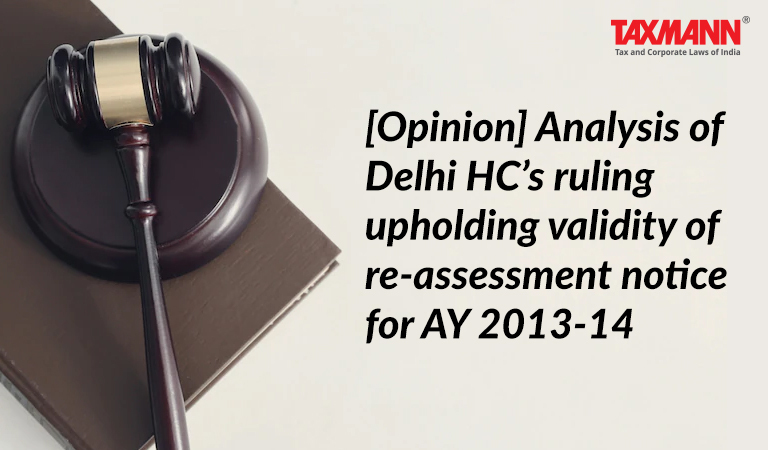[Opinion] Analysis of Delhi HC’s ruling upholding validity of re-assessment notice for AY 2013-14
- Blog|News|Income Tax|
- 3 Min Read
- By Taxmann
- |
- Last Updated on 14 October, 2022

1. In respect of cases where notice u/s 148 have been issued between the period from 01.04.2021 to 30.06.2021, the provisions of s. 147 and 148 of the Act, as amended by Finance Act, 2021, have been a matter of discussion and debate since a long time.
2. The controversy arose due to the extension of the time limit for issue of various notices by the Taxation and Other Laws (Relaxation and Amendment of certain Provisions) Act, 2020 (‘TOLRA’), the subsequent Notifications No. 20/2021 dated 31.03.2021 and Notification No. 38/2021 dated 27.04.2021 nd the amendment to s. 147 to s. 151 by the Finance Act, 2021.
- Decision of Hon’ble Supreme Court in case of Union Of India v. Ashish Agarwal [2022] 138 taxmann.com 64/286 Taxman 183/444 ITR 1]
3. Recently, the Hon’ble Supreme Court in the case of UOI v. Ashish Agarwal [444 ITR 1] decided the issue of validity of the notice u/s. 148 issued during the period from 01.04.2021 to 30.06.2021 by holding that the extension granted by TOLRA after the enactment of Finance Act, 2021 cannot be invoked following the erstwhile provisions of s. 147 to s. 151 when the substantive provisions of s. 147 to 151 of the Act have been substantially amended by Finance Act, 2021 w.e.f. 01.04.2021. The Hon’ble Court therefore upheld the findings of various High Court that the notices issued u/s. 148 of the Act after 01.04.2021 as per the procedure laid down under the old law were invalid. However, with a view to ensure that the departmental efforts are not made redundant, the Hon’ble Court invoked Article 142 of the Constitution and held that all the notices issued u/s. 148 in accordance with the erstwhile law shall be deemed to be the notice u/s. 148A of the Act under the new law as amended by Finance Act, 2021. The Hon’ble court also provided guidelines with respect to the procedure to be followed and directed the officers to issue notice u/s. 148 of the Act after following the procedure laid down u/s. 148A. Later CBDT also issued Instruction No. 01/2022 dated 11.05.2022 giving guidelines to the departmental officers to issue notices.
- Decision of Hon’ble Delhi High Court in case of Touchstone Holdings (P.) Ltd. v. ITO [142 taxmann.com 336]
4. Subsequent to the said decision of Hon’ble Supreme Court and the consequential Instruction issued by CBDT dated 11.05.2022, several notices issued by the officers, particularly for A.Y. 2013-14 to A.Y. 2015-16, have been subject matter of writ petition before various High courts wherein the validity of these notices have been challenged on the ground that the time limit for issue of such notice as provided u/s. 149 of the Act has expired and hence the notices are time barred.
5. Recently, one such petition have been decided by the Hon’ble Delhi High Court in the case of Touchstone Holdings (P.) Ltd. (Supra) wherein the Hon’ble Delhi High Court has held that the notice u/s. 148 of the Act for A.Y. 2013-14 was not time barred and held that the assessment proceedings are validly taken up.
6. The said decision has been a matter of discussion and debate amongst the professional fraternity since it is strongly believed that the notices issued u/s. 148 of the Act for A.Y. 2013-14 to 2015-16 now are time barred. The said decision is therefore analysed to understand its facts and the decision rendered.
Click Here To Read The Full Article
Disclaimer: The content/information published on the website is only for general information of the user and shall not be construed as legal advice. While the Taxmann has exercised reasonable efforts to ensure the veracity of information/content published, Taxmann shall be under no liability in any manner whatsoever for incorrect information, if any.

Taxmann Publications has a dedicated in-house Research & Editorial Team. This team consists of a team of Chartered Accountants, Company Secretaries, and Lawyers. This team works under the guidance and supervision of editor-in-chief Mr Rakesh Bhargava.
The Research and Editorial Team is responsible for developing reliable and accurate content for the readers. The team follows the six-sigma approach to achieve the benchmark of zero error in its publications and research platforms. The team ensures that the following publication guidelines are thoroughly followed while developing the content:
- The statutory material is obtained only from the authorized and reliable sources
- All the latest developments in the judicial and legislative fields are covered
- Prepare the analytical write-ups on current, controversial, and important issues to help the readers to understand the concept and its implications
- Every content published by Taxmann is complete, accurate and lucid
- All evidence-based statements are supported with proper reference to Section, Circular No., Notification No. or citations
- The golden rules of grammar, style and consistency are thoroughly followed
- Font and size that’s easy to read and remain consistent across all imprint and digital publications are applied



 CA | CS | CMA
CA | CS | CMA
